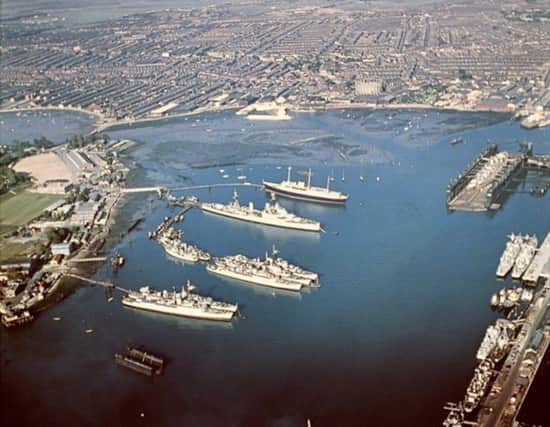If only we had substitutes like these we could bring on today


At the time of writing we have 20 commissioned major fighting ships plus 11 submarines of two different classes.
With the commissioning of the new aircraft carrier HMS Queen Elizabeth that takes the total to just 32 vessels.
Advertisement
Hide AdAdvertisement
Hide AdIn all, including minesweepers, patrol vessels and the like, the navy has 78 commissioned ships with 33,000 personnel.
In this photograph from 1959 we see eight vessels tied up alongside HMS Excellent, Whale Island.
This is just part of the reserve fleet named HMS Bellerophon.
This includes Boxer, Liverpool and Vanguard. The much-missed royal yacht Britannia can also be seen.
At that time the Royal Navy’s man/womanpower was 102,000.
Advertisement
Hide AdAdvertisement
Hide AdTo the right a ship can be seen in the floating dock, another part of the navy that has since disappeared in Portsmouth.
Getting way from the immediate subject in hand, in this photograph the M275 has yet to be built and the gas holder at Rudmore can be seen along with Mile End Cemetery to the right of it.
The Continental Ferry Port is also many years in the future.
Look at the thousands of houses covering Tipner and North End, it is a wonder Portsea Island has not sunk.
Last week I asked if anyone knew how to pronounce Cosham.
Advertisement
Hide AdAdvertisement
Hide AdMark Newman dropped me a line to say the correct pronunciation is Coz-em and he has always used this pronunciation.
He can remember being in senior school in the late 1960s and a teacher showing the class an extract from a book about the history of Portsmouth. It said the correct pronunciation was Coz-am, but because over many years the population of Portsmouth increased because of a huge influx of workers and military, these new residents saw the word Cosham written before they heard it spoken, so they presumed it was Cosh-am.
And before long, apparently, we were saying Cosh-am not Coz-am.
During the 1970s fewer and fewer people were saying Coz-em and by about the late 1970s or early ’80s Mark gave up saying Coz-em because he got fed up with people questioning his pronunciation even though he knew he was right.
Advertisement
Hide AdAdvertisement
Hide AdMark says you would have thought that the same would have happened to Southwick which is pronounced Suth-ick and not South-wick, as in the place just outside Brighton.
Also, if anyone is heard to say Bosh-am they are always corrected to pronounce it Boz-em.
So there we are then, Cosham it is.
If I mention HMS Vanguard most people who remember will think of the battleship that almost ploughed into Point, Old Portsmouth, while being towed to the breaker’s yard on August 4, 1960.
But there was another battleship of the same name that disappeared from view in a matter of minutes when she blew up at anchor in Scapa Flow on July 9, 1917.
Advertisement
Hide AdAdvertisement
Hide AdShe took with her 845 of the ship’s company. Just three survived.
With the sinking of HMS Hampshire in 1916 with the loss of 737 men, and in 1939 the loss of HMS Royal Oak taking 834 men to a watery grave, that is a total of 2,416 British seamen lost in those Orkney waters in three years.
At 11.20pm on July 9, 1917, flames were seen coming from Vanguard.
Shortly after, a small explosion quickly followed by another, increased the flames and smoke.
Advertisement
Hide AdAdvertisement
Hide AdWhen the night breeze blew the smoke clear, Vanguard had disappeared.
Among the dead were two Australian seamen from HMAS Sydney who were locked in the cells.
The cause of the explosion was either the ignition of cordite or abnormal deterioration of cordite charges.